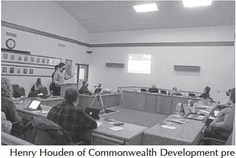Housing proposals show path for the future


If the city of Medford wants to maintain what it now has as far as jobs, industry and retail, the community will need to grow. That growth will require adequate, affordable housing for young people and families.
Like rural communities across the country, Taylor County is a victim of demographic creep with the average age of residents moving steadily upward. For decades, Medford has resisted this demographic trend by drawing in workers from surrounding areas. That well is rapidly running dry as families continue to have fewer children and nearby communities face diminishing workforce populations. Competition for workers is continuing to heat up. Faced with the challenge of filling the jobs needed to keep plants running, the area risks being bypassed when it comes to expansions or upgrades.
Decades ago, the city leaders recognized the need for government to take an active role in looking out for the economic health of the community. Groups, such as the Medford Area Development Foundation, working in partnership with local government have helped build the community’s industrial and retail base.
In order to maintain viability into the future, Medford needs to attract families and young people. A key part of this is through having adequate, affordable workforce housing.
Monday, aldermen heard presentations from two firms looking to develop an unused industrial parcel into housing for up to 40 families with the emphasis on those making between $39,000 and $60,000 a year in family income.
The four-acre parcel in question is located on Progressive Avenue just north of Northcentral Technical College and has sat undeveloped for nearly two decades.
Not only would the proposed development bring much needed entry-level housing to the community, but with an estimated $9 million in projected value, would be a boost to the local tax base.
Beyond the direct tax boost, having an additional 40 families coming to the area will have a signifiant economic impact as they purchase items and services at area stores. More people means more customers for retail stores and service industries.
The other major advantage of the proposals is that it is largely hands-off in regard to the city. Unlike other development deals which seek concessions or involve large infrastructure investment, this one actually sees developers not asking for any special favors from the city government.
While many people are turned off by dense residential developments such as the ones being proposed, they serve a valuable and necessary role filling in the gaps and reducing sprawl. These types of dense residential areas make delivery of utilities and services more efficient while being tied into the greater community.
The city of Medford should quickly move forward in developing an unused industrial parcel for a workforce housing project and should look to the future for other opportunities to increase residential base in the community.

